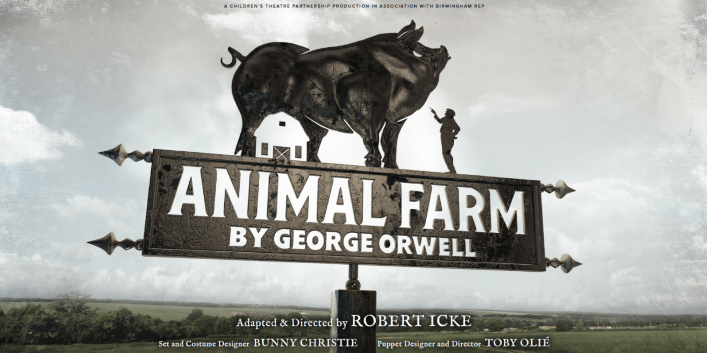Animal Farm // Q&A with director Robert Icke

Animal Farm was Orwell’s response to Russia’s descent into dictatorship after the Revolution; what’s its relevance today?
The novel uses animals to think about humans, and the ways in which power structures and hierarchies form even when everybody has made a big decision to get rid of those things. It’s a simple story: the animals have a revolution and clear out a corrupt old hierarchy to give themselves freedom, and then slowly piece by piece a corrupt hierarchy – of pigs - builds its way back again.
In my adult life we’ve not really been blessed with great political leaders in Great Britain – or even confident opposition leaders - although I struggle to see it as tyrannical, like human rule is over the animals. But certainly, we have come to see a more divided politic, more polarization and less empathy. The differences feel very real and you do start to hear talk of revolution as a possibility.
What was the appeal for you?
I like to do new things, and I had never made a show with puppets before, though I’d had a few ideas in my back pocket about them, to do with things like scale. You know, I can’t have three Andrew Scotts of different sizes and do different tricks with them. But I CAN have three versions of Boxer the carthorse. We plan to use little puppets to give a sort of Google Earth view from the rooftops: you’ll see them chasing each other, then when they reach a corner we bring in the life-size puppets, panting. It's an almost all-puppet cast and they all talk, and it’s been interesting working out what conversations puppets could plausibly have with each other and which feel… just not right. Not a problem that Orwell had to get around in writing prose! But if you think about the Muppets, through Babe, to Pixar films, there are lots of stops on the road in terms of how you pitch talking animals. I probably won’t go for real animals, but other than that, anything could happen.
Why do you find it necessary to rewrite or rework classic stories?
There’s always been a feeling in me that theatre is about repeating a ritual, like a birthday. Every year it is still your birthday, but it’s a different birthday because you are a year older and maybe the people are different. For me it’s always felt like a form of dishonesty to pretend that there is a way to do any play or any production as the golden version that should be set in aspic.
Is Animal Farm designed for all ages?
I hope so. It’s not the jolliest of stories, but I think kids enjoy that. We’ll have to see how violent the violent bits are: we discovered in workshops there’s something very depressing and distressing about a puppet being killed, even more so than an actor. But access is hugely important to me and I’m not sure I’ve ever made anything where I wasn’t conscious of the thought that a 14- or 15-year-old might come and see it and enjoy it. Most people who work in and around theatre got hooked at around that age, including me. And I really trust young people as a sort of boring-ometer [laughs].
How was your lockdown?
I was lucky in that no one in my immediate circle became sick and my family and friends were all ok. The peace and quiet was nice, the lack of planes in the sky. A whole lot of work things moved into next year and may still fall apart even though they have pencilled dates. I played a lot of piano and I delivered some screenplay drafts that I’d been promising I’d do for a while but never got round to because I was so busy doing theatre. Both new projects, neither of which I am allowed to talk about yet.
Apart from the films, what’s your ambition for the future?
The ambition, the dream, has for the last few years been to work out if there is a possible way that one could have a permanent ensemble company based in London that could make new work in English in the way they have here in Amsterdam, across the German speaking world, and in other places. The leading actors I have worked with a lot have over the years have now become friends and they have a huge appetite to do theatre. But could you pay them properly? What contracts could you offer? Could they have months off to go and film if they wanted to? I don’t know the answer to that.
--
Animal Farm will be at the Playhouse Tue 26 Apr to Sat 30 Apr. Tickets £10 - £30.
Posted in PLAYHOUSE